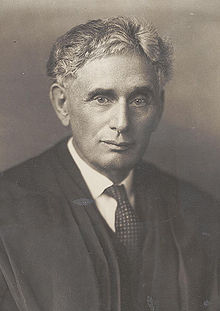Louis Brandeis
Louis Dembitz Brandeis (born November 13, 1856 in Louisville , Kentucky , † October 5, 1941 in Washington, DC ) was an American lawyer and from 1916 to 1939 the first Jewish judge on the United States Supreme Court .
Life
Brandeis was born in Louisville, Kentucky. His parents Adolph and Frederika (née Dembitz) Brandeis came from the Jewish community in Prague and emigrated to the USA after the revolution of 1848/49 in the Austrian Empire , where they opened a grain trade. Louis Brandeis attended Louisville Male High School, graduating with honors in 1872 at the age of 14.
Due to economic mishaps and the long depression that was just beginning after the founder crash of 1873, Adolph Brandeis had to sell his company and went to Europe with the family. Louis Brandeis attended the Realgymnasium Annenschule in Dresden during this time . In 1875 the family went back to the United States, where Brandeis began studying at Harvard Law School . As the best of his year, he graduated from law school in 1877. Brandeis is a co-founder of the Harvard Law Review .
In 1916, Brandeis was appointed Supreme Court Justice by US President Woodrow Wilson and remained in office until 1939. Despite the anti-Semitic hostility of some colleagues, such as James C. McReynolds , he initiated a process of rethinking there over many years: Reform laws in the field of economics and industrial relations were less and less declared unconstitutional by the mostly conservative judges, but especially in the New Deal time accepted in principle.
Brandeis was also one of the presidents of the Zionist Organization of America , a spokesman for American Zionism and a supporter of the progressive wing of the Democratic Party .
One of his most important achievements is the development of the “right to privacy” within US law. Between 1888 and 1890, Brandeis and his partner Samuel Warren wrote three fundamental articles on the subject for the Harvard Law Review , which resulted in these rights being recognized in US law from then on (see Privacy # story ).
Louis Brandeis is an honorary member of the Phi Beta Kappa Academic Society .
legacy
After Louis Brandeis is Brandeis University in Waltham , Massachusetts and the Louis D. Brandeis School of Law of the University of Louisville named. His academic papers are known as the Brandeis Papers in this University of Louisville Law School.
The International Center for Ethics, Justice, and Public Life at Brandeis University regularly organizes an international judges' meeting to exchange views and experiences on questions of international jurisdiction ( Brandeis Institute for International Judges ).
Is also named after Brandeis the Brandeis Brief , a certain type of pleadings presentation in court proceedings.
literature
- Ernst Fraenkel : Louis Brandeis - Reformer of Democracy , in: Deutsche Universitätszeitung , vol. 12 (March 20, 1957), No. 5/6, pp. 17-20. Reprinted in Ernst Fraenkel: Gesammelte Schriften, Volume 4, Amerikastudien , edited by Hubertus Buchstein and Rainer Kühn, Nomos, Baden-Baden 2000, pp. 260–268, ISBN 3-7890-6161-1 .
- Leonard Baker: Brandeis and Frankfurter: A Dual Biography , New York 1984. ISBN 0-06-015245-1 .
- Philippa Strum: Brandeis: Justice for the People , Cambridge (Mass.) 1984. ISBN 0-674-53921-4 .
- Lewis J. Paper: Brandeis: An Intimate Biography of One of America's Truly Great Supreme Court Justices , Englewood Cliffs (New Jersey) 1983. ISBN 0-13-081299-4 .
- Jacob de Haas : Louis D. Brandeis: a biographical sketch; with particular reference to its contribution to Jewish and Zionist history; with the text of his speeches, 1912–1924 . Translation of Nadja Stein . Berlin: Fischer, 1930.
Web links
supporting documents
| personal data | |
|---|---|
| SURNAME | Brandeis, Louis |
| ALTERNATIVE NAMES | Brandeis, Louis Dembitz |
| BRIEF DESCRIPTION | American lawyer |
| DATE OF BIRTH | November 13, 1856 |
| PLACE OF BIRTH | Louisville , Kentucky |
| DATE OF DEATH | October 5, 1941 |
| Place of death | Washington, DC |
